
Other items in today’s column include:
*San Diego County Jewish community online
*San Diego County Judaica
*San Diego/Israel Connections
*Mazal tov! Mazal tov!
*In memoriam

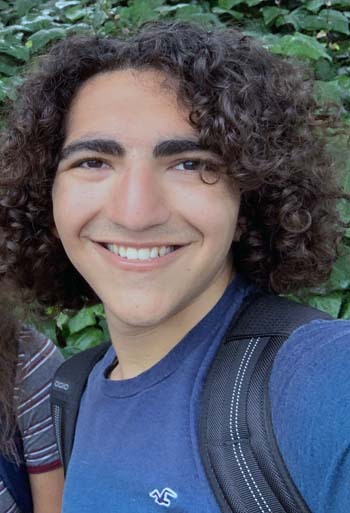
SAN DIEGO — With in-person classes transferred to Internet learning at UC Berkeley, my grandson, Shor Masori, is back home in San Diego, monitoring his classes via computer. Recently, he and his fellow undergraduates received a notice from Bob Jacobsen, Letters & Science Dean of Undergraduate Studies. It began, “The chair of the Academic Senate has written to explain that for this semester only, the default grades that instructors will give are Pass and No Pass.”
He offered the following assurances:
“1) A notation on every student’s transcript will explain the changes made this semester. Please bear in mind that future employers and admission committees will be seeing similar notations on transcripts from virtually every college and university in the U.S.
“2) Classes taken this semester will satisfy University, campus, College, major and minor requirements even though they receive P grades.
“3) Limits on the total number and types of courses taken P/NP will be relaxed.
“4) Graduation GPA standards will be relaxed to take this semester’s P grades into account.”
There were other points to Jacobsen’s letter, but I want to emphasize Point 9): “Although we strongly recommend against it, students can request a letter grade provided they do so before May 8th.”
Therein is the conundrum. Suppose you’re a student and you think you are getting an “A” in the class. Should you request the letter grade?
Shor’s anthropology professor Sabrina Agarwal weighed in on the question in a letter to her students. She wrote, “You might have the impulse to optimize your GPA by selectively choosing some courses for grades and other courses P/NP. For your own health & well-being, to avoid sending mixed signals with a mixed transcript, and in consideration of where we are now and how rapidly things can change, I urge you to think very carefully before gaming a semester unlike any other I have experienced. It is unclear how it will work on your transcripts. Even if you choose P/NP instructors will maintain and submit records of letter grades if needed or requested.
“I hope this might take the pressure of many of you on the grading aspect of the course, and allow you to continue to engage with the lectures and sections (live or recorded) and the assignment.”
Shor told me that he appreciates that UC Berkeley is being “accommodating and understanding to students in these trying circumstances.” As to whether he will seek letter grades or Pass/No Pass, he told me his decision will depend on how other students are responding. “I’ll do Pass/ No Pass unless it puts me at a disadvantage,” he said.
*
San Diego Jewish community online
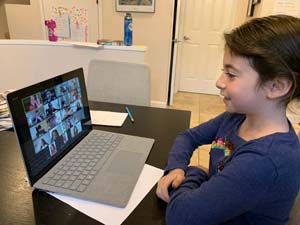
* Chaim Heller, the head of school at San Diego Jewish Academy, reports that the PK-12 school has transitioned successfully from in-class to online learning. “Our faculty and students from Kindergarten on through 12th grade are well-equipped and deeply committed to continuing the learning for students — they just do it now through digital platforms,” he writes. Amplifying, SDJA spokesperson Jason Edelstein said: “Preschool parents receive art projects and hands-on activities to do with their children. Lower grade students participate in whole class sessions and small breakout sessions with teachers and classmates via Zoom meetings to continue with curriculum, from general studies and Judaica to special classes and more. Middle and upper school students participate in full class sessions online while continuing to work independently on research projects and other ongoing course work.” Jessica Fink, a parent of two elementary school students, comments, “The school is helping parents gain confidence and understanding with all these new ways of learning. For us, feeling knowledgeable and able to support our children is so critical and helps us maintain some sense of normalcy.”
*Rabbi Yoni Danzger of Beth Jacob Congregation will instruct a class at 8 p.m. Wednesday via Zoom on “Insights into the Haggadah.” Other 8 p.m. classes will include “How to Conduct a Seder” by Rabbi Avram Bogopulsky on Monday, March 30; and “A Fresh Outlook on the Pesach Season” by Rabbi Danzger on Wednesday, April 1.
*Camp Mountain Chai is offering Jewish Camp at Home via Facebook to keep youngsters entertained during these days of self-quarantine and isolation. Some sample program topics from the Jewish community-run camp are “Friendship Bracelets” and “Mallows”, respectively at 9:30 a.m. and 11:30 a.m. tomorrow; “Family Yoga at 1:30 p.m. Thursday; and “Zumba” and “Afternoon Coffeehouse Singing,” respectively at 9:30 a.m. and 1:30 p.m. Friday.
*Fairbanks ranch resident Lauren Lizerbram, with help from her husband Sol Lizerbram, who is the national president of the Jewish National Fund, will demonstrate live on line the way she makes challah for Shabbat, at 1 p.m., Thursday, March 26, via this Zoom connection. For those bakers, who want to follow along, step by step, here is her list of materials and ingredients: 2 very large bowls; wooden spoon; 2 cookie sheets lined with parchment paper; plastic wrap; 2 large plastic bags large enough to hold the bowls; 2 tablespoons active dry yeast; approximately 8 cups of bread flour; 1/2 cup warm water (as warm as if you were bathing a baby); 3/4 cup granulated sugar; 1/2 teaspoon vanilla; 3 1/2 teaspoons kosher salt; 3 eggs plus 1 yolk at room temperature; 1/2 cup vegetable oil; and for egg wash/toppings: 1 egg plus 1 yolk; pinch of salt; sesame or poppy seeds for sprinkling if desired.
The Leichtag Foundation and The Hive will Internet-cast a program on “Navigating Uncertainty While Maintaining Community” moderated by Chaya Gilboa, Leichtag’s director of Jewish engagement, at 11 a.m., Friday, March 27. Register via this link.
*
San Diego County Judaica
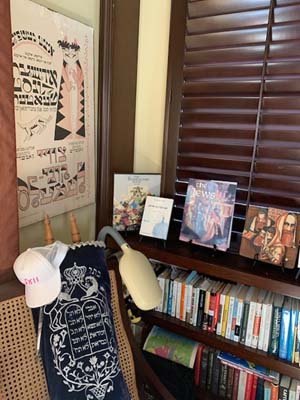
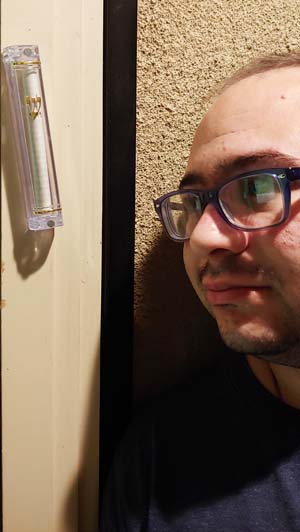
Daniel Ajzen, publisher of the Spanish-language Diario Judio, has a Judaica corner which includes art, a Torah mantle, and numerous books on Jewish topics. A favorite item is an old Yiddish theatre poster. San Diegan Dylan Bailey writes that “Rabbi Shuie Goldstein (Chabad of Poway) blessed us by blessing our new home with a kosher Mezuzah as he placed it on our doorpost with prayers. Since then, we have felt like we had a lot of luck and in times of stress we look to that Mezuzah to know that God is watching out for us and protecting us from harm, illness, and showing us a little light.” La Jolla resident Jacob Kamaras, a public relations consultant and former editor-in-chief of the Jewish News Syndicate (JNS), says of his Kiddush fountain: “When you’re hosting a larger crowd for a Shabbat meal, you pour the wine in the large cup and it trickles down into the eight smaller cups. Today, it reminds me that once we overcome the virus and social distancing ends, we’ll be able to enjoy Shabbat meals together again.”
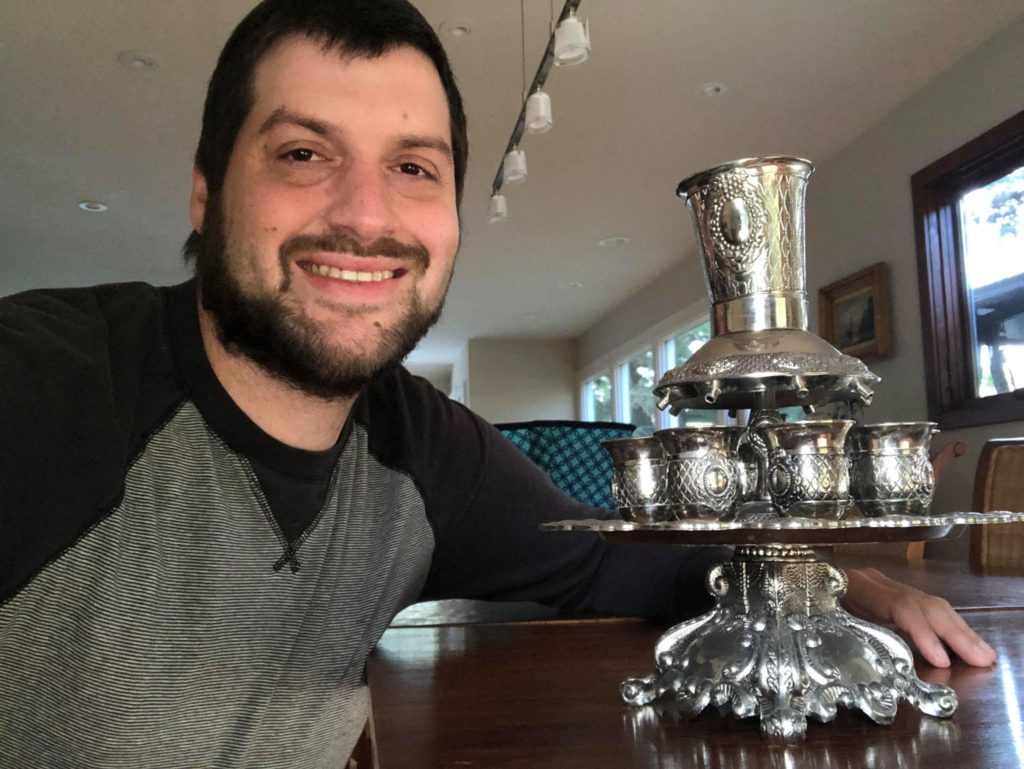
*
San Diego/ Israel connections
Recently, I reviewed Growing Up Below Sea Level, a memoir by Rachel Biale about life on Kfar Ruppin. In the review I mentioned that the kibbutz south of the Kinneret and less than a mile from the border with Jordan, had San Diego connections. Author Biale subsequently wrote to me: “My brother, who lives at Kfar Ruppin, sent me the attached photo this morning of the stone tablet commemorating the donation for the building of the reservoir. Your readers may enjoy seeing it.” The monument credits San Diegans Melvin Garb, Harrison Levin, and Genesse Levin. Thanks, Rachel!

*
Mazal tov! Mazal tov!
*Beth Jacob Congregation reports that Scott & Sarit Reich are grandparents, their children David & Deena Reich in New York having just become the parents of a son.
In memoriam
Mark M. Gordon, 72, died Tuesday, March 24. His graveside funeral service will be conducted by Rabbi David Castiglione and Cantor Lori Wilinsky Frank of Temple Adat Shalom at 2 p.m., Wednesday, March 25, at El Camino Memorial Park, 5600 Carroll Canyon Road, San Diego.
*
Donald H. Harrison is editor of San Diego Jewish World. He may be contacted via donald.harrison@sdjewishworld.com Obituaries in San Diego Jewish World are sponsored by Inland Industries Group LP in memory of long-time San Diego Jewish community leader Marie (Mrs. Gabriel) Berg.
Hi Don, I was so happy to see the words “KFAR RUPPIN” while reading this article. I first arrived at Kfar Ruppin as a Volunteer in 1971. I only planned to stay there a month or two but three years later became a citizen of Israel and a member of the Kibbutz. I ended up staying through most of the 70’s. At that time there was a terrible water shortage in Israel and the Israelis became experts at using it in the most advantageous ways. The eastern border of the Kibbutz is the Jordan River and there is a large bend in the river where it turns completely around and flows briefly from South to North and bends again to the south farther to the east.. By digging a deep and very large hole in the bend of the river, and surrounding the hole with a long birm, we were able to collect the water each winter when the river would flood. Having this extra water to use each summer enabled us to increase production of our crops. This is just one of the many ways Kfar Ruppin has been able to make the most of what little water they had in those days. Now i hear that water is no longer a problem for Israel. By use of desalinization, reclamation, improved irrigation practices and other techniques, Israel now has a surplus of water and are able to share it with their neighbors. I do know that everything they have done there, can be done here in California,. We need only to be proactive and less reactive.